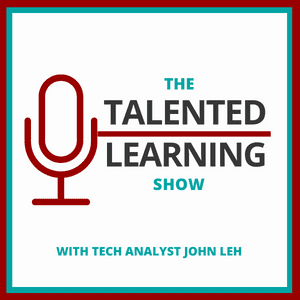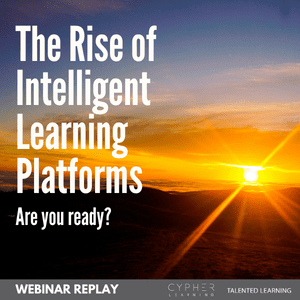
Podcast: Play in new window | Download
Subscribe: Apple Podcasts | Spotify | Amazon Music | Android | iHeartRadio | Blubrry | Email | RSS
EPISODE 37 – TOPIC SUMMARY AND GUEST
As always, we have a fantastic learning tech expert lined up for today. Our guest, Ashish Rangnekar, CEO and Co-Founder of BenchPrep, is a passionate advocate of lifelong learning via innovative digital education.
For many years, Ashish has been focused on providing platform solutions that help organizations create and deploy impactful, modern, ROI generating, competency-based, gamified, adaptive, micro, digital education for trade associations as well as education and training companies.
Whenever Ashish and I speak and share notes, I’m always floored by the breadth of his knowledge and how he can distill complex topics down to easy-to-digest nuggets. I’m sure you will be floored too with this interview!
KEY TAKEAWAYS:
- This whole idea of “career for life” and the traditional mindset of “learn, do, retire” no longer provides a future-proof approach. We are living in a world where it’s “learn, earn, learn, cycle, repeat.”
- Education and training companies need to think digital education first, digital education only and digital all.
- Microlearning, adaptive learning and great learning are and always have been based on skill and competency models
- Adaptive learning is all about competency, confidence and time to achieve
Q&A HIGHLIGHTS:
Ashish, let’s set the stage. Tell us about yourself and how you came to start BenchPrep?
My undergraduate degree is in mechanical engineering. I have a master’s in applied mathematics and then I have an MBA, so too many degrees.
Now, this whole thing started about 10 years ago, when I was living in New York. I was working with CapitalOne Financial doing corporate strategy work. My goal was to go to a top business school and for that I was preparing for my GMAT exam.
And when I looked at the options available to me to help me, I was really disappointed, because the options didn’t really fit my lifestyle…I could either buy a $20 book, which is not interactive, not smart and I had to lug it around. Or I was expected to spend like two grand on a live classroom when one it’s expensive, but you know, it also expected me to walk into a classroom every Tuesday at 6pm, which I just couldn’t do.
And at the same time, I don’t know if you remember this, but Apple had just opened up the iPhone platform and there were all these crazy apps out there.
There was an app where you can actually kind of guzzle a beer and it would show like the beer like going down. There was an app that could you could actually make like fart noises — never gets old. People were so fascinated with it and the level of engagement was crazy.
And I took a step back and I said, here I am trying to learn and study for something that’s gonna change the trajectory of my life. But I can’t find a good solution. And here is a platform that is really engaging, but no one is actually building something useful.
So my co-founder and I got together and long story short, we released the first “assessment engine” on iPhone ever. This was the first GMAT prep app. We released it in December of 2008, a few months after Apple had opened up the platform. That one app became 90 apps. And we were the highlighted educational provider by Apple. Those 90 apps became a platform and the platform became the company that we are today.
Wow! Fantastic story! Tell us about BenchPrep and what it is you do as an organization…
There are four guiding principles that we believe in. This is what we’re trying to solve for. And the learning platform is a means to that end.
The first guiding principle that we have is that the modern learner is different. Today’s professional looks and behaves very differently. They are untethered. They are on the go all the time. They are impatient, they can’t watch a YouTube video any longer than 12 minutes. They are overwhelmed. They get too many Slack messages, too many emails, too many Zoom calls…it takes a very different approach to engage this modern professional.
The second guiding principle is that lifelong learning has become an absolute economic reality. This whole idea of “career for life” and the traditional mindset of “learn, do, retire” no longer provides a future proof approach. We are living in a world where it’s “learn, earn, learn, cycle, repeat.”
The third belief that we have is that as learning is becoming more lifelong, is getting more unbundled and getting to micro-level, what matters at the end of the day is someone being able to say that “yes” this person can do the job. Because it’s not just about knowledge anymore.
I mean, you can go to YouTube and watch any video to do anything. But as an employer, how do I make sure that this professional has the right competencies? That’s why we feel that “verified credentials” are important. So not just any kind of knowledge, but verified credentials are the currency in the labor market.
So you put these three together, like you have to engage the model learner on a lifelong journey, so that they can get a verified credential of some sort at the end. And then you look at the education and training companies and you realize that they have to go through a massive transformation to deliver lifelong learning to the modern world.
And that’s what our mission is.
We enable education and training companies to transform their business by helping them deliver best-in-class learning. Our job is to help education and training companies generate revenue and retain customers in a very engaging and meaningful way.
Next question – how has the worldwide pandemic impacted your business? Do you find there is now more, less or the same demand from education and training companies?
These are unprecedented times. And it’s not only everyone’s business is getting impacted in ways that we never thought, but you know, people’s lives are getting impacted. No one was prepared for it by any means.
When I think of our business specifically, I feel in this unfortunate event, we find ourselves in a time where digital learning has suddenly become an absolute reality. It has become critical to business continuity for these organizations. So it’s not just like, oh, it’s nice to have — it’s an absolute must-have.
Being a modern digital learning platform, we feel that we have a unique opportunity – almost a responsibility – to help these organizations that are in immediate need of creating an online learning environment post-COVID-19. So, we are getting inundated with all kinds of
requests because different organizations are kind of coming at it in different ways. But there is one thing that is consistent and that is this transformation to digital learning is getting accelerated at a pace that we never thought we would see…
Everybody wants to act fast, but what about the quality of the content? Do you see a change in buyer habits that they’re looking to use this opportunity to leapfrog their competition or is it more about speed, cost or survival?
Content is a big part of it. But I think even before content, what’s happening right now is everyone is taking action and everyone wants to jump in, but buying motivations are very different based on where the organization is in their digital transformation cycle.
So we have a few organizations coming to us that are very early in their transformation cycle had no digital learning capabilities, and they are truly scrambling because they need something now. For them, it’s a matter of survival and revenue continuity.
Then there are customers who have already made investments in digital, and those investments are doing really good, and hence these organizations want to double down…
But then I think the most fascinating part has been that there are customers that are rightfully acknowledging that there is nothing called post COVID world. There’s nothing like it. We are living in a world with COVID – period. And these organizations are thinking about this in a very long-term way. And they are willing to reinvent their business model, because they know that this is not a short term, you know, pivot or fix.
You’re gonna come out of this, and this is what the reality is going to be. Now, this is rare, and only a few organizations are thinking about it, but that’s the approach we’re taking with our customers. And you take this mindset and you think of content and what ends up happening is a lot of organizations, you know, look at this opportunity to go remote.
But remote learning is not online learning. It’s very different. To be able to deliver exceptional digital learning, I almost think that you need to think digital first, digital only and digital all. Because digital is just not a channel…
I’ll give you two specific examples. So in general, in the analog world, things are much more linear than in the digital world where things can actually be much more personalized and fluid. When we think of the unit of content in the analog world, it is like chapters and courses that are much more macro in nature. When this content has to be translated to the online world, we believe it has to be packaged in a very micro-unit. Every chapter, every concept, every video, every article has to be tagged so that the experience doesn’t have to be linear in nature so we can deliver the right content module at the right time at the right place.
So how does adaptive learning fold into this digital education conversation? What does that mean? And how does that align with microlearning? What’s the connection?
Philosophically, our approach to adaptive learning is that at the end of the day, learning is a means to an end. So the quicker we can get someone to achieve competency, the better it’s going to be for them. It’s not about how many hours did someone spend in a particular program, but how quickly they obtain competency. With that goal in mind, we approach adaptive as a way to help figure out the best learning path for an individual user. And we think about it alongside three dimensions.
First is competency:
What is the specific goal and competency this user wants to achieve?
Second is confidence:
How confident can this user be when they achieve the competency? The last thing that you want is, you know, yeah, I scored 90% on an exam, but I still don’t feel good about the particular concept. I am not confident in it. Right? And if you’re not confident, it’s not going to show up in your job.
And the third piece is time:
We want someone to achieve competency and confidence in the shortest period of time possible.
So we take these three and what we end up doing is we tag every piece of content so that we can actually reconstruct the learning experience with that goal in mind. The microlearning kind of fits very well with the adaptive learning experience, because if we can deliver the right micro-unit at any given point, then we can actually build the learning towards this bigger competency.
Most organizations are somewhere in between the analog and the digital. Is there an in-between phase of assembling the smaller pieces together in certain orders or in recommended orders, or is it truly just pulling from here and there based on tags? What’s the correct way to think about it?
I think the best way to think about it is to start with some kind of competency and skills map. Building and creating content is very expensive. Very expensive. And you can spend a lot of time and money creating content, but if it’s not well understood what the goal is, then it becomes a wasteful exercise.
So our recommendation is to always start with specific competencies and map them to content. Once you have the competency map, and then you take your content and you start mapping, you’ll be able to see where the gaps are…
Outstanding! So my understanding is that BenchPrep is offering educational and training companies a “Quick Start” package to help them make the pivot in these unprecedented times. Could you tell us about what that entails?
Absolutely. So when, as I said, you know, we find ourselves in a situation where a lot of education and training companies out there are in immediate need of creating an online learning environment. And in response to this need, we have launched a new program. We’re calling it the “BenchPrep Quick Start” program.
This program is intended to assist companies that are focused on in-person training, so that they can confidently and very quickly move their learning programs to digital and allows for a very quick onboarding, very straightforward contracting and reduced pricing.
What’s the best advice you can give an organization that is now faced with making the immediate shift to digital education?
…FOR COMPLETE ANSWERS TO THIS AND ALL OTHER QUESTIONS, LISTEN TO THE FULL 30-MINUTE PODCAST!





